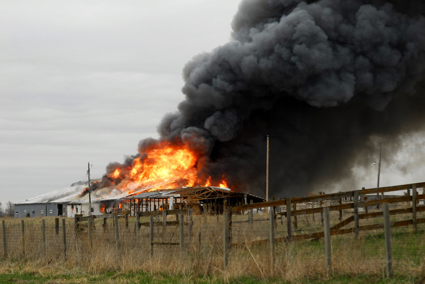How to Use Personal Stories That Make an Impact
Many people ask me about my barn story. It’s a part of business storytelling that’s necessary for being a trainer.
It’s a story that I mention during conversations once in a while, or, if you’ve been in a class where the subject has come up, you’ve probably heard it or something similar.
I’ll explain the last time the story came up so that you get why I tell this particular story.
How I Use a Personal Experience in Business Storytelling
I was standing in front of a room full of IT managers and employees. Having been brought in by the C-level leadership team, whom I had performed our GAP analysis and ‘Takeaways’ meetings with the previous week. These are meetings that help me to figure out what sort of training event is needed, experiential, adventurous, team building etc.
The meetings went something like this: One business owner believed that there was a serious issue with the several departments’ communication and actual implementation. The 2nd Founder and Partner, on the other hand, believed that the problem was exclusive with the 1st Partners team and that he had hired much better people.
They had originally asked me to come to train on Project Management. Towards the end of the GAP analysis, I casually asked if they wanted to discuss the fact that their teams would most likely grow in their division/silo because they had the room to do so without impediment, slowing down implementation even further.
They looked at each other for the first time and asked what I meant.
One of the most important aspects of my job as a master trainer is to begin the conversations that no one inside the organization is willing to begin. In the instance of the IT company, it was the fact that their company had begun to build silos based upon how they perceived the two owners. The two of them had begun to ‘walk on eggshells’ around each other in order to avoid confrontation, but had also begun to display body language (rolling eyes, smirking, and of course the heavy sighs), that indicated that there was a growing division. Their team had simply chosen sides. How to get this point across to them without the obligatory, ‘we both agree to hate you’ result. This is my job after all. We talked about what I meant for a bit, and I ended the discussion with, “Well, since you invited me here to train on Project Management, what would you like me to do if this particular subject, which will look like change to you folks, comes up? It would be best if you were in the room to address it…”
They agreed to have a discussion offline about their own issue, and that I should address it in the room if it came up.
It came up.
Using a Personal Story in a Business Setting
On the day of the training, as I met the various people coming into the room, I could easily tell which people were on which team. Half of them, about 20 people, walked in laughing and talking, most had brought food to share, while the other half walked in, made little to no eye contact when we shook hands, and rolled their eyes when looking at the white-board.
(If you’re new training, get used to this, it’s actually a pretty decent room to have.)
Almost immediately, the lead of one of the groups began to challenge, at first to the partner, (whom she had seated herself next to, the other partner had pushed a couple of tables together forming a ‘U’ shape with his team literally ‘circling the wagons’), and then when I asked her to share, she simply stated, “I know all of this already.”
“Ah. Good.” A meaningful look at both partners with an eye-brow raise making certain that they wanted to get this conversation started received instant confirmation from both.
After asking her to explain the situation. She described the situation as containing workflows, communication standards and SOP’s (standard operating procedures), which not only were no longer being followed, the lack of compliance had actually resulted in several people being fired and several others leaving the company.
When I pulled the rest of the room into the conversation, we received even more details, with one partner being impressed by the political savvy of some of ‘his’ employees, while the other partner beamed at the fact that his ‘favorite’ (called this by nearly every employee in the room, manager, and non-manager), showed mounting annoyance at having to be in the room because she knew all of that. She stated this easily a dozen times.
All according to plan.
As she did so, more and more of ‘her’ people began to agree with her, some even moving closer to that particular table in order to show solidarity, while most settled for the implicit agreement of a simple nod.
I took the opportunity of a lull in the conversation to look at no one in particular, and mention:
“Your barn is on fire.”
Storytelling in Business
After a moment of confused silence, I told this story:
(I have written here the long version, but the point remains the same.)
When I was a child (cute as a button of course), my family and I would go to Niles, Michigan to visit my Great-uncle Roosevelts’ farm. I loved it there because it was like going back in time. There was no indoor plumbing, so you had to use an outhouse and get water from the pump about 20 yards away from the front door. The water was always cold and delicious. When we visited, I would often spend a good deal of my time divided between running around and playing with the various farm animals and hauling buckets of water from the pump to the house.
On this particular occasion, our family had been joined by my great-aunt Bernice and my uncle Walter. They, like my father and step-mother, were smokers. My Great-uncle Roosevelt and his wife..uh..Auntie…both hated cigarette smoking.
“There’s no bigger waste of time, other than TV”, Roosevelt would say every time one of them took a cigarette out. In fact, he’d said it so often, that all of the smokers had begun to smoke by the ‘old barn’, that is, the barn that had been built sometime in the 1920’s and stood nearly half an acre away from the house. It was now in a state of disrepair because Auntie had insisted on a new barn sometime between the 1960’s, one that was closer to the house. This made the old barn an ideal place for the smokers in my family to go to smoke in ‘peace’ away from disapproving eyes.
It was on one such occasion that I joined them. You see, the barn had also been my escape from everyone.
So, on a hot summer day in late July, I found myself running around the grass in the barn, jumping and hiding from whatever evil supervillain my 8-year-old imagination had summoned, when, from my hiding spot, I spied my Aunt Bernice, Uncle Walter and my Parents walking up to have their after-dinner cigarettes. Being the amazing super-hero that I was at 8, I decided to see how close I could get to them before they saw me. As I crept closer to them, I could hear them all talking loudly and laughing about who had one the latest round of Gin-rummy and how they had suspected my Uncle Walter of being a card-shark at some point in his past, when I realized that one of them had flung their cigarette away, without putting it out.
The barn was now literally on fire.
Not a big fire. But growing steadily. I froze for a moment waiting to see what the grown-ups would do. Well, to be more accurate, I hid because this would be a long way for their ‘number 1 water hauler’ to bring water from the pump. Hiding was easier, and even then, I loved watching people learn what their motivations were.
That is until I realized that other than the same laughter about the card game, there was no movement. At all.
It was odd since they were all facing the slowly growing fire. Maybe there was something else going on, I thought. They must have been doing something else. The fire had now spread to several of the old wooden boards and was gaining momentum. I switched positions, perhaps they couldn’t see it somehow?
As I walked up to stand beside the adults, they laughed and looked at the barn without acknowledging the now larger fire.

I looked up at my Father, whom I was standing beside, and not being able to interrupt adults speaking, I had to wait until there was a break in the conversation before I politely said: “Daddy. The barns on fire.” He responded, “Huh? Oh, yeah, yeah son.” But no movement.
One by one I went to each adult and repeated my observation, with varying degrees of comments, but no degree of attention or success. I found the entire situation quite odd.
Finally, my Great-Grandfather, Alton came running around the corner from the house. Waving and yelling as his eyes darted from the fire to the adults standing in front of it incredulity plainly showing on his face. Incredulity turned to shock and anger as he got closer until he began shouting, “Hey! Can’t you all see that the barns on fire? Do something!”
It was like the other adults had seen the fire for the first time. They began shouting about putting it out. My uncle took off his shirt and began hitting the now burning grass next to the barn in an attempt to put it out. “Go Grab some water!” someone shouted at me (of course!) and so I began to run towards the pump. The barn burned down before the sun was completely down. The fire department had gotten the blaze under control rather quickly, really, while shaking their heads at my family’s apparent inaction at the beginning.
Epiphany Through Business Storytelling
On more than one occasion, while speaking to a director or manager, or business owner about the issues with his or her team, the burning issue is quite apparent. In this instance, the employee in question laughed and said:
“That’s hilarious!” She said laughing. “So, they just stood there? What idiots!”
“Yes. It’s really funny how sometimes people get so wrapped up in other dialogues that they can fail to notice what’s going on right in front of them. By the way…your barn’s on fire.”
She stopped laughing, while I got to ask the two questions I knew we had been leading up to but had to wait for them all to be ready to actually answer.
I turned slightly to the white-board where I had been writing down the issues that they talked about, the issues that they ‘knew’ and I asked the first question:
“So, you all know these are your main issues. What have you done about them so far?”
Some companies have opted to simply let the situation smolder a bit, sometimes doing more damage to their employees, customers and their organizations own reputation.
I turned prepared to write.
Silence.
“Right. Well, no matter, today is about the future anyway. What are you all going to do, as a team, starting today? Let’s come up with an actual plan.”
Just like my family’s initial reaction (and my own), sometimes it isn’t enough to merely point out the issue. As a Master Trainer, and Leadership coach, if I’m doing my job correctly, this is the moment.
 This is one of those critical moments. It’s the moment where I get to fade into the background and wait for the person to decide if she or he is going to be a bystander…or a firefighter. In these instances, it has to be up to the Manager or Director, or even the company to decide their next course of action…if there is even going to be one. Some companies have opted to simply let the situation smolder a bit, sometimes doing more damage to their employees, customers and their organizations own reputation. While others, like my Great-grandfather, upon immediately assessing the situation, decided to ‘do something’.
This is one of those critical moments. It’s the moment where I get to fade into the background and wait for the person to decide if she or he is going to be a bystander…or a firefighter. In these instances, it has to be up to the Manager or Director, or even the company to decide their next course of action…if there is even going to be one. Some companies have opted to simply let the situation smolder a bit, sometimes doing more damage to their employees, customers and their organizations own reputation. While others, like my Great-grandfather, upon immediately assessing the situation, decided to ‘do something’.
In those circumstances, I roll up my sleeves and become a fire chief. Not just to put out the current fire, but to help companies look at the situations that allowed those fires to begin in the first place. Like that barn, sometimes a company’s day to day operation is too far away from their written mission and values. Or sometimes fear of ‘making waves’ has replaced the need for a true plan of action.
And sometimes? They just need someone (not amongst their own ranks) to look at their barn and say the words.
So, this is me asking you the question: “Is your barn on fire?”
If so…now what?






Leave a Comment